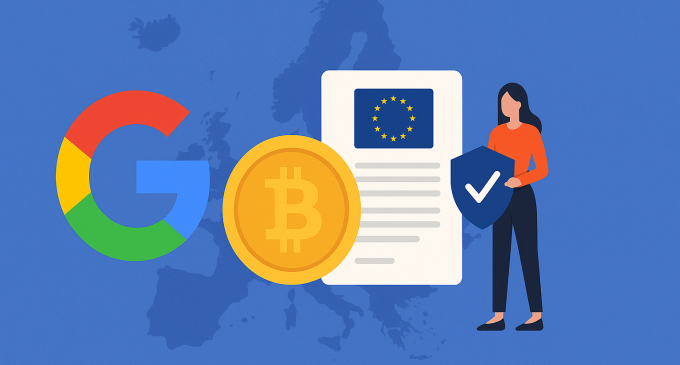
Introduction
In a move poised to reshape the cryptocurrency advertising landscape across Europe, Google has officially announced the enforcement of MiCA regulations for all crypto-related ads within the European Economic Area (EEA). The decision, effective from April 2025, marks a major shift in how digital platforms approach crypto promotion, aligning with the European Union’s landmark Markets in Crypto-Assets (MiCA) regulatory framework. As the world’s largest digital advertising platform tightens its compliance, crypto companies, investors, and advertisers must prepare for a transformed regulatory environment that emphasizes transparency, consumer protection, and market integrity.
The Context Behind MiCA: Europe’s Bold Step Toward Crypto Regulation
The Markets in Crypto-Assets Regulation, commonly known as MiCA, was introduced by the European Union in an effort to standardize the fragmented regulatory environment surrounding digital assets. MiCA aims to create a single licensing regime across EU member states, requiring crypto companies to meet specific obligations in terms of security, investor protection, and transparency.
Passed in 2023 and entering phased implementation throughout 2024 and 2025, MiCA has been lauded for its comprehensive approach, covering everything from stablecoins to crypto asset service providers. Unlike the reactive stance taken by many regulators globally, the EU’s proactive framework is viewed as a blueprint for responsible innovation, striking a balance between consumer protection and market development.
Google’s decision to align its advertising policy with MiCA’s compliance standards signals a strong endorsement of regulatory harmonization and legitimizes MiCA as a global benchmark for crypto governance.
Why Does Google’s Policy Shift Matters?
Google holds a dominant share of the global online advertising market. Its ad network spans billions of daily searches, app monetization channels, and media content across platforms like YouTube and Android apps. When Google changes its policy, the ripple effects are felt industry-wide.
By enforcing MiCA rules, Google ensures that only registered and compliant crypto firms can promote their services across Europe. This means ad buyers must possess valid authorization under MiCA, disclose accurate product risks, and refrain from promoting misleading, speculative, or high-risk products without proper warnings.
This policy shift:
- Enhances consumer safety by filtering out dubious operators.
- Reduces advertising space for scam projects and pump-and-dump schemes.
- Creates a level playing field for legitimate crypto businesses.
- Encourages greater institutional participation through credibility boosts.
Ultimately, this move is not just about compliance — it’s about trust-building in the maturing crypto ecosystem.
What MiCA Means For Crypto Advertisers On Google?
Under MiCA, any crypto asset service provider (CASP) operating in the EU must be authorized by a competent national authority. For advertisers, this means a valid license is now a prerequisite for campaign approval on Google Ads.
Here are the main MiCA-related requirements advertisers must meet:
Licensing: Proof of registration with an EU-based regulatory authority.
Risk Disclosure: Clear and concise language warning users about volatility, capital loss, and service limitations.
Transparency: Accurate descriptions of the product or service, including fees and user responsibilities.
Restrictions on Leveraged Products: High-leverage derivatives or unregulated DeFi tools may be excluded from advertising eligibility.
Ban on Misleading Claims: No promises of guaranteed returns or exaggerated benefits.
Google’s automated review process will now integrate MiCA-compliant checks to ensure that any ad shown within the EEA adheres to these standards.
Who’s Affected: Startups, Exchanges, Wallets And Influencers?
The new regulations will impact a wide range of stakeholders in the crypto marketing space. While major centralized exchanges like Coinbase or Binance may already have compliance teams prepared for such regulatory shifts, smaller platforms and DeFi startups may find it more difficult to navigate the new terrain.
Crypto wallets, payment gateways, educational platforms, and NFT marketplaces will also need to adjust their strategies. Social media influencers and affiliate marketers promoting crypto services on Google-owned platforms must now ensure that the products they promote are MiCA-compliant — or risk ad takedowns and account penalties.
This change could further marginalize influencers and content creators who rely on crypto advertising revenue unless they partner with regulated firms.
From Free Market To Filtered Market: The End Of The Wild West Era
The crypto advertising world has historically been a loosely regulated space, giving rise to thousands of questionable promotions, pump-and-dump tactics, and misleading campaigns. In 2018, Google temporarily banned all crypto ads, only to lift the ban in 2021 with stricter policies. However, enforcement was patchy and often dependent on user complaints or keyword flags.
Now, with MiCA as the baseline and automation at the forefront, Google’s compliance infrastructure is becoming far more robust. This is a clear step away from the freewheeling early days of crypto marketing and a move toward a more institutionalized, regulated landscape.
The new system offers both benefits and drawbacks:
Upsides: Better consumer protection, fewer scams, improved public image for the industry.
Downsides: Higher entry barriers for new projects, limited exposure for DeFi innovations, regulatory burden for small teams.
How Advertisers Can Prepare?
Crypto businesses looking to maintain or expand their digital advertising footprint in Europe need to act now. The first step is to ensure their operations are compliant with MiCA or are working toward authorization. Simultaneously, ad content must be restructured to reflect MiCA’s transparency and disclosure requirements.
Steps to take:
Legal Audit: Consult a legal firm specializing in EU financial services.
Ad Compliance Review: Revise ad copy, landing pages, and user disclosures.
Verification with Google: Submit required documentation for advertiser approval.
Ongoing Monitoring: Stay updated with changes to local interpretations of MiCA in different EU countries.
Those who are prepared will be rewarded with increased visibility in a less crowded and more credible advertising environment.
Broader Impact On The Global Crypto Landscape
Although MiCA is specific to the EU, Google’s global presence means that this enforcement could act as a model for other regions. Advertisers in the UK, U.S., and APAC markets will likely see similar regulatory adaptations in the near future.
Google’s choice to adopt region-specific crypto policies also encourages other tech giants, including Meta and TikTok, to follow suit — potentially initiating a global compliance wave.
In the long run, such frameworks could foster cross-border regulatory cooperation, reduce fraud, and create better synergy between financial authorities and the tech sector.
Industry Reactions: Support, Skepticism And Strategy
Reactions within the crypto industry have been mixed. Regulated companies welcome the clarity, seeing it as a step toward mainstream acceptance. In contrast, some DeFi purists criticize the move as stifling innovation and centralizing control.
Statements from major players include:
Kraken: “We support efforts to increase consumer safety while preserving innovation. MiCA provides much-needed legal clarity.”
Chainlink Labs: “It’s time for Web3 projects to evolve beyond hype and embrace operational transparency.”
An anonymous DeFi developer on X: “This is regulatory capture in slow motion. Innovation will move offshore.”
While there are concerns about over-regulation, many agree that a lack of rules has done more harm than good — with numerous scams tarnishing the sector’s reputation over the years.
Conclusion
Google’s enforcement of MiCA rules for crypto ads in Europe marks a watershed moment in the global digital marketing landscape. As the world’s most influential tech company begins implementing stringent compliance protocols, crypto firms must rise to the occasion — or risk being sidelined in one of the world’s most lucrative markets.
The move symbolizes more than just policy change — it’s a signal that the crypto industry must now operate by the same rules that govern traditional finance. Transparency, accountability, and consumer protection are no longer optional; they are the new normal.
In embracing MiCA, Google is not merely complying with regulation — it’s setting the standard for how tech, advertising, and crypto can coexist in a fair and sustainable way.







There are no comments at the moment, do you want to add one?
Write a comment